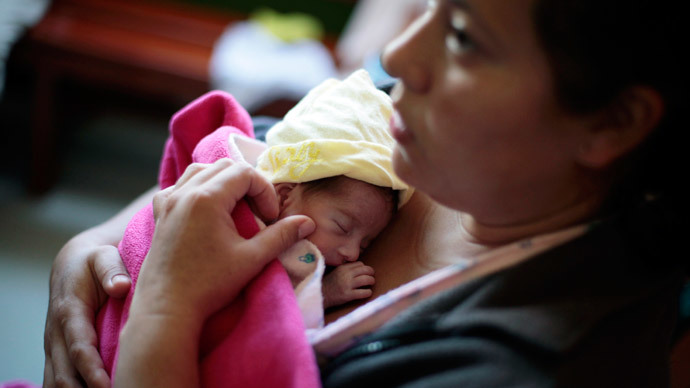The United States is one of only three countries in the world that does not offer a monetary supplement to new mothers on maternity leave from their jobs, according to a United Nations study.
The report, prepared by the UN’s International Labor Organization, found that the only two other nations that do not provide cash benefits during maternity leave are the absolute Persian Gulf monarchy Oman and Papua New Guinea, where violence against women is such an epidemic that 60 percent of men have acknowledged committing rape, according to the UN data.
The world’s other 182 nations surveyed offer new mothers on maternity leave either a government payment – akin to Social Security – or require employers to continue to supply at least some percentage of the woman’s pay.
Paid paternity leave for new fathers is offered in 70 countries. Norway, for instance, recently extended its paternity leave to 14 weeks, the UN found.
The US also offers new mothers fewer weeks of maternity leave than any other Western country, the study found.
US law requires employers to offer new mothers as many as 12 weeks of unpaid leave. In New Zealand, leave offered is 14 weeks, while Australia’s is 18 weeks. Switzerland allows new mothers to take 18 weeks off, while paying them 80 percent of their salaries through a government program similar to US Social Security.
The International Labor Organization found that governments pay for leave in most, or 107, of the surveyed countries, using national social security plans. In 45 nations, employers pay the benefits, and 30 countries use a mix of government and employer payments.
The UN agency said it prefers when governments prepare payment plans for maternity leave rather than employer-based options. The organization said that leaving individual employers with costs could hurt businesses or lead to a bias against hiring female employees.
Though the last two decades have seen improvements in maternity leave policies around the globe, the report found that monetary support for maternity leave in half the surveyed countries is “neither financially adequate nor sufficiently long lasting.”
Around 830 million women workers “are not adequately covered in practice, mainly in developing countries,” the UN agency said.
The International Labor Organization’s maternal protection specialist, Laura Addati, said that 98 nations meet the agency’s 14-week standard, and that 74 countries met its standard of offering cash benefits of at least two-thirds of earnings during maternity leave.
Among other major Western countries, Germany requires that mothers have 14 weeks of leave with full pay via government and employer provisions. Great Britain allows a mother an entire year off, with payments in the first six weeks equaling 90 percent of her salary. Payments then drop to the equivalent of US$232 per week or 90 percent of pay, whichever is less, for the next 33 weeks.
The report said the US could join the rest of the world if it passes the Family and Medical Insurance Leave Act of 2013, proposed by Rep. Rosa DeLauro (D-CT). The bill would establish a national paid family leave insurance program to offer 12 weeks of paid leave for reasons of childbirth, serious illness, or care for a sick family member. The bill has little chance in the Republican-led House of Representatives.
The study did note that five US states – California, Hawaii, New Jersey, New York, and Rhode Island – mandate paid maternity leave.

